Seminarians return from Rome
Floersch in self-quarantine at St. John's Rectory
March 26, 2020
On a normal day, the streets of Rome bustle with activity: tourists tossing coins into Trevi Fountain, viewing mosaics at St. Peter's Basilica or taking in ancient history at the Colosseum or Pantheon.
As COVID-19 wound its way through the Italian countryside, infecting approximately 64,000 natives, activity in the nation's capital slowed to a standstill.
Studies continued at the Pontifical North American College, despite the lull of activity across the sprawling city of eight million residents.
By the evening of March 10, Paul Floersch and Zach Tucker, seminarians from the Omaha Archdiocese studying in Rome, received a phone call from Father Andrew Roza, director of vocations with the Archdiocese, directing the two to return stateside.
Roza had been following the situation in Italy.
"It was an easy call to bring them home," he said.
Thirty hours later, they boarded a plane and prepared for the day-long flight, Rome - Amsterdam - Minneapolis - Omaha, with wheels down at Eppley Airfield around 8 p.m.
From there, Tucker returned to his family home, settling in the basement of the ranch-style house.
Floersch's parents left a car at the airport.
"The keys were under the driver's mat. They filled a car with food and I drove all the way to the rectory at St. John the Baptist."
Floersch said he and Tucker will be in self-quarantine for two weeks, unless they exhibit symptoms of the virus.
So far, no evidence of complications in either have manifested.
First cases
Floersch said when the first cases were reported in Wuhan, China, nothing in Italy - or his classes - seemed out of the ordinary.
"I'm in a lecture hall with 160 people. A couple people may have been sick. There may have been a few who should have stayed home due to coughs or colds."
By January, though, as the influenza season began, there was an uptick in pneumonia cases.
Tucker said he didn't notice people becoming ill, nothing out of the ordinary.
"We're young men, so we're not going to be affected as badly as the demographics that are being hurt the most, but there was a weird cold going around the house," Floersch said.
He experienced some type of illness in late January.
"All the symptoms, shortness of breath, cough, fatigue. It was present, but it didn't debilitate me from going to class or exercising. I was still doing all the normal things. I just felt awful for about a week and a half or two weeks," he said.
The first reported case in Italy came near the end of January. In the beginning, a majority of cases were reported in the Lombardy region, in northern Italy.
As of March 24, 64,000 cases have been confirmed and 6,077 people have died from the infection.
Floersch said he and fellow students watched news of the pandemic, seeing it spread across a map of Italy.
Even in Lazio, the state Rome is located in, "one day there were 40 cases. The next, 80. It was doubling," Floersch said. "Maybe it's time to get out of here."
The decision
On March 5, Italian officials closed all schools and universities.
By March 9, a nationwide lockdown was in place.
Tucker said he had been forwarding information about the virus and conditions to the Archdiocese.
"In light, I think with some of the travel restrictions coming in and some of the uncertainty of the situation, we were the relayers of the news, but ultimately, the decision came from Fr. Roza," he said.
Floersch said he'd noticed fewer and fewer tourists in Rome proper.
"It was bizarre," he said. "You would walk by the Pantheon or other monuments and there would be a lot of tourists in the area. In the past couple of weeks, there were fewer and fewer."
Tucker noted a distinct drop off in tourism, too.
"As cases started to rise in the north, I saw a corresponding drop of visitors in Rome."
A sign of the seriousness of the situation.
As the seminarians prepared to make the return home, decisions needed to be made about where to self-isolate.
Floersch said he did not want to stay at his family's home.
"I have little sisters and didn't want to be around people. I wanted an actual quarantine," he said.
He emailed Roza and asked if a rectory might be available. A connection was made with Fr. John Norman, St. John's parish priest.
"He set me up at St. John's," Floersch said.
About the carload of supplies from his parents: "My parents made a Costco run, getting enough supplies for two weeks. I'm a 27-year-old man, but I'm still dependent on my parents," he said, laughing.
Norman dropped off a few essentials since Floersch has been at the rectory.
"Someone even made a pumpkin pie," he said.
Country hospitality continues at its best, even in the age of COVID-19.
Tucker opted to self-quarantine in the comfort of his family home.
He said the basement is self-contained, with all the amenities he needs.
"I can spend my two weeks in comfortable conditions. I sit at the bottom of the stairs and have a conversation when we eat dinner," he said.
The future
Floersch first attended Benedictine College in Atchison, Kansas.
"I had a religious conversion there. I was Catholic, but I really started to love being Catholic during college.
It was a natural progression that led to joining the seminary.
He arrived in Italy in fall 2017 and was scheduled to be there until his ordination, set for the spring of 2021.
Located near St. Peter's Basilica, the college affords its students an area to pray and live. Classes are held at different spots in the city.
"It's awesome. It's totally transformed my faith."
Floersch said he's had two conversions in his life. The first, at Benedictine. The second, in Rome.
"You see the fossils of Christianity in all of Europe, but particularly in Rome. Every corner, there's a church. Not just a little hole-in-the-wall church. A magnificent building. It's mind-boggling."
He realized it the first time he visited St. Paul's Basilica.
"To see that, to know my name comes from this guy ... when I recognized that, it hit me like a ton of bricks."
He will miss Rome, but classes will continue.
All his courses for this semester are available via distance learning. A few teachers have made videos and posted them online, while others record audio which is available online.
He isn't sure what fall 2020 will bring.
"If I can't go back, that's a great question," he said. "With limited contact between people, practicing social distancing, you could still send someone to study there. It's all in God's hands."
Roza said a lot of groups, including NAC, Archdiocese and other diocese across the country, are "grappling with reality. We don't know how long this will take. We're all trying our best to find our way."
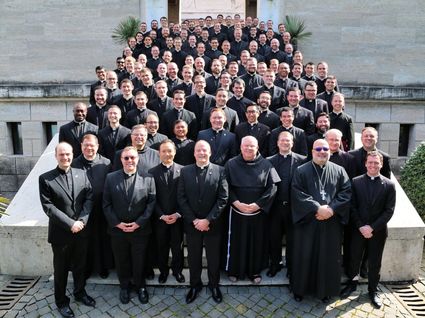
Courtesy photo
In Italy • On March 15, seminarians and staff at the Pontifical North American College, in Rome, were photographed following Mass. All seminarians have been ordered to return to the United States by the endof this week.
Tucker moved to Italy in August 2016.
This was his last semester there.
"It's one heck of an ending," he said.
His classes also meet online via Google Meet. The only difference is the six-hour delay.
"It's actually worked fairly well, better than I would've expected," he said.
His ordination is still scheduled for June 6.
Roza said the archdiocese will follow CDC guidelines for the public ordination.
"I hope we're able to proceed" he said.
While the spread of and concerns about the virus have disrupted his life, Tucker views the aftermath in a positive way.
"It's highlighted, on a personal level, the goodness and generosity of human beings," he said. "In the quarantines, where there's been suffering, there's also a lot of humanity on display, in the best way."

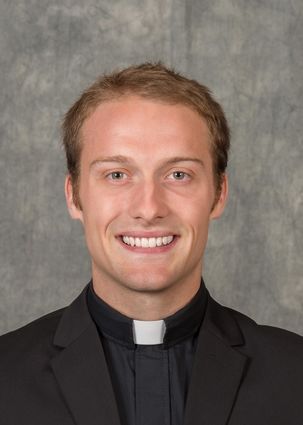
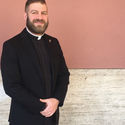
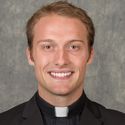
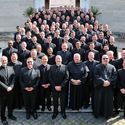




Reader Comments(0)